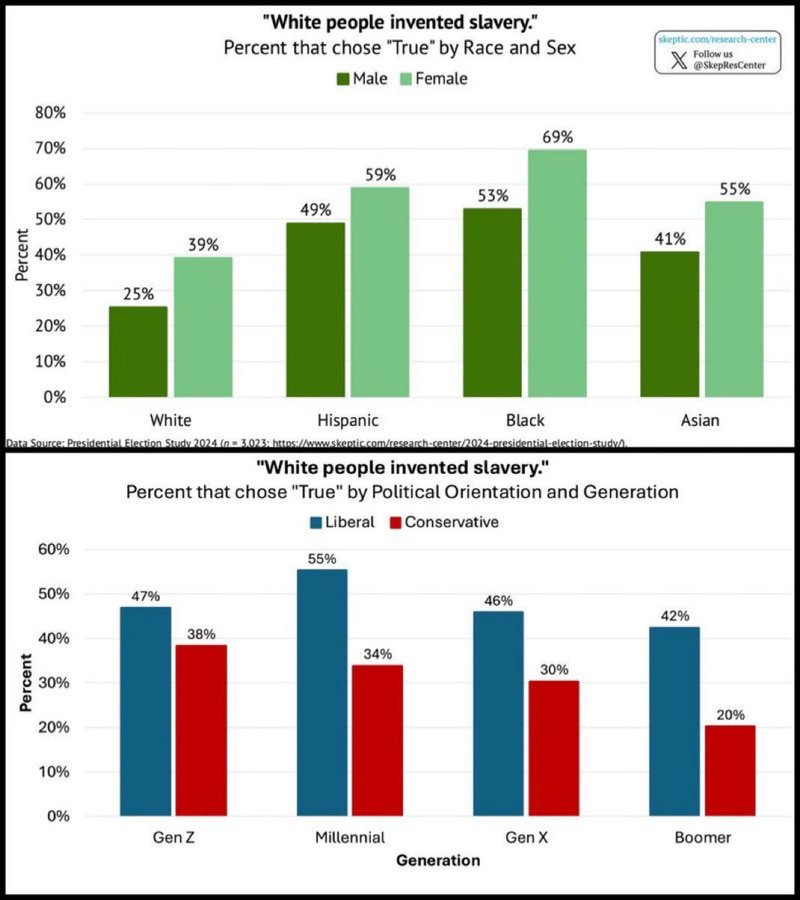The Slavery Myth
How activist narratives rewrite the past to control the present.
It is astonishing — and deeply alarming — how many people, across demographic lines, now endorse the statement “White people invented slavery.” The data I’ve seen is not a small aberration: depending on race, gender, generation, and political affiliation, belief in this falsehood ranges from a quarter of white men to nearly seventy percent of black women. Even among older conservatives, a non-trivial fraction nod along.
This is not a harmless mistake. It is the predictable result of decades of educational drift, activist narrative compression, and the willing surrender of historical complexity to political utility.
Educational Drift and Narrative Framing
Modern Western curricula devote disproportionate attention to the Atlantic slave trade and its racialized form in the Americas. These are important chapters — but when they become the only chapters, they breed a quiet but potent historical amnesia. The brutal commerce between European traders and African kingdoms from the 16th to 19th centuries is taught as if it were the opening act of slavery itself, rather than one of its later, industrial-scale mutations.
Omitted, or reduced to passing footnotes, are the millennia of enslavement that predate European colonial expansion: Mesopotamian debt bondage, Egyptian corvée labor, Greek and Roman slave economies, the vast trans-Saharan and Indian Ocean slave trades run by African and Arab powers, the indigenous slave systems of the Americas. By omitting the pre-European record, educators leave an epistemic vacuum — one that activists and propagandists are more than happy to fill.
Activist-Driven Historical Compression
Moral storytelling thrives on simplicity: the oppressed and the oppressors, the villains and the victims. In the American political lexicon, “white” has become shorthand for the historical oppressor class. Once that equation is in place, the jump from “white people were central to the Atlantic slave trade” to “white people invented slavery” is effortless — and, crucially, it is not experienced as a leap at all. It feels true because it fits the moral template.
The truth — that slavery is as old as agriculture and as global as humanity itself — is not morally convenient. It muddies the narrative. And so it is pruned away.
Cognitive Shortcuts and Association Bias
Most people, when they hear “slavery,” summon a single image: the American South before 1865. It is the version that saturates popular culture, literature, and political rhetoric. Other slaveries — equally brutal, equally dehumanizing — are invisible to the mental searchlight.
Confirmation bias does the rest: if your political identity is anchored in a racial justice narrative, a claim that assigns unique guilt to white people for slavery will feel intuitively correct. Fact-checking it can even provoke hostility, because you’re not just challenging a fact — you’re challenging the moral scaffolding that person stands on.
Gender and Identity Effects
Across every racial category, women in the data are more likely to believe the statement than men. This is not mysterious. Social psychology has long documented higher rates of moral conformity among women in group-norm contexts. In a social environment where public anti-racism is a moral litmus test, aligning with the activist narrative is both socially rewarded and psychologically safe.
Generational and Media Dynamics
Younger generations have been marinated in a discourse that centers racial injustice as the defining throughline of history. Social media rewards the most emotionally charged and simplified claims. “White people invented slavery” is a perfect specimen for virality: short, accusatory, and unfalsified by the shallow historical memory of its audience.
Political Polarization
The partisan divide in the data is stark. Liberals are consistently more likely to endorse the statement than conservatives. This aligns neatly with the ideological incentives: progressives gain rhetorical power by tying modern inequities to an unbroken lineage of white oppression, while conservatives gain by breaking that chain, insisting on complexity and rejecting inherited guilt.
Why It Matters
This is not about pedantry. If large segments of the population can be induced to believe a claim this wildly ahistorical, then historical literacy is in collapse. Worse, history becomes a tribal totem rather than a shared record. Facts no longer arbitrate disputes; they are chosen for tribal utility. And from there, mistrust calcifies. Groups taught to believe they are perpetual victims of a uniquely evil Other will behave accordingly. Groups taught they are uniquely guilty will respond with defensiveness, resentment, or disengagement.
The Reality
Slavery is older than writing. It has been practiced by every civilization that managed to accumulate surplus and power. The Sumerians, the Egyptians, the Chinese dynasties, the Indian kingdoms, the Islamic caliphates, the Mongols, the Aztecs — all enslaved. White Europeans neither invented slavery nor were they the most prolific practitioners in history. They were, however, the first major civilization to abolish it worldwide through sustained political, military, and economic pressure.
That final fact is conspicuously absent from the activist narrative. And until we teach history as it is, rather than as it is politically useful to be, these falsehoods will continue to metastasize — and with them, the corrosion of our collective sanity.



